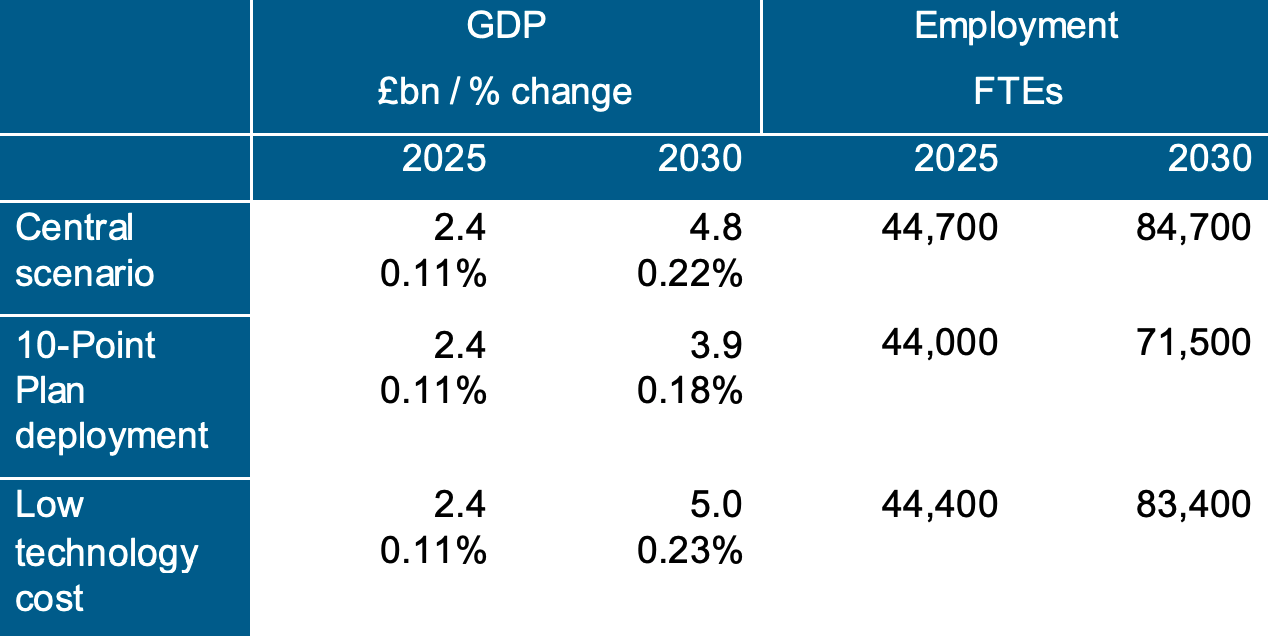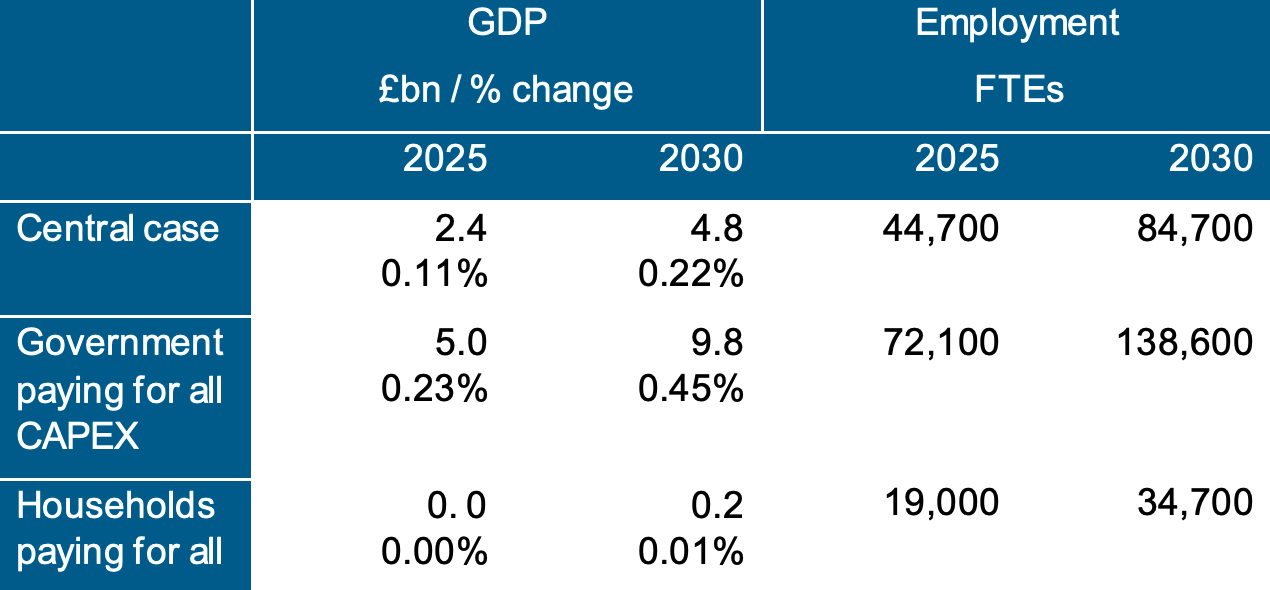For the full report, please download the PDF.
Executive Summary
Introduction and the rationale for this study
Emissions from residential buildings, primarily from the use of fossil fuel for heating, are a major source of the UK’s CO2 emissions. As a result, and as part of its 10 Point Plan to build back better and support the UK’s transition to Net Zero, the UK Government have set an ambition to deploy electric heating in residential buildings, by delivering 600,000 heat pumps installations per year by 2028. However, the Climate Change Committee’s 2021 Progress Report to Parliament states that this target is insufficient and should be upscaled to 900,000 installations per year by 2028, if the path to Net Zero is to be successful (Climate Change Committee, 2021).
An ambitious deployment of low-carbon heating technologies, together with the implementation of energy efficiency measures in residential buildings, has the potential to improve the efficiency, and reduce the environmental impact, of the UK’s housing stock, while at the same time creating jobs and economic activity and addressing issues of inequality and social inclusion.
This report provides a robust analysis of the potential macroeconomic impacts of deploying energy efficiency measures and low-carbon heating technologies in the UK’s residential buildings. The analysis is intended to highlight the potential return on action to increase take-up of such technologies and inform the debate on the policy needed to put the UK’s household heating stock on the right trajectory for net zero.
What scenarios were modelled?
In this analysis, three scenarios were modelled:
- a ‘central’ scenario (reflecting the CCC’s Balanced Net Zero Pathway ambition for heating technologies and energy efficiency). In this scenario average heat pump installation costs are assumed to start at £11,855 in 2021 and decrease over time in line with the CCC’s assumptions.
- a ‘10-Point Plan deployment’ scenario (reflecting the UK Government’s lower ambition for the deployment of low-carbon heating technologies). The cost trajectory for heat pump installations is assumed to be the same as in the Central scenario.
- a ‘low technology cost’ scenario (reflecting a significant decrease in the average costs of heat pumps including installation, from the current assumption of £11,855 to £5,500 in 2022, as some industry players anticipate, and to further decrease over time, albeit at a slower rate than in the Central scenario).
Impacts of the scenarios are compared to a ‘no action’ counterfactual, drawn from the CCC’s Sixth Carbon Budget baseline.
Key macroeconomic impacts
The table below shows the economic impacts of shifting to low-carbon heating and implementing energy efficiency measures. The economic impacts shown in the following table include direct, indirect, and induced effects.

The headline messages from these results are:
- There are positive impacts on GDP across the three modelled scenarios. Increased ambition in terms of the number of heat pumps deployed, or the substantial lowering of costs associated with heat pump installation, would lead to greater economic benefits for the UK economy by 2030, as demonstrated by the results of the ‘Central’ scenario and ‘Low Technology Cost’ scenario respectively.
- There is substantial job creation associated with all three scenarios, with around 44,000 net jobs created in 2025 in all scenarios (taking account of potential job losses associated with the shift away from fossil fuels). By 2030, the largest employment impacts are associated with the Central scenario, again demonstrating the additional economic benefits that can be attained by greater deployments of heating.
- The deployment of low-carbon technologies results in a large number of manufacturing jobs being created in the production of low-carbon equipment (i.e. heat pumps). Similarly, enhanced energy efficiency in residential buildings results in more jobs being created in construction, and a smaller number in manufacturing. Supply chain effects and increased consumer spending because of greater employment leads to further jobs being created, primarily in services sectors.
How do the economic impacts vary when we consider ‘who pays’?
In this modelling analysis, assumptions were developed to outline the amount of public and private investment required to finance decarbonisation measures in residential buildings; essentially, how much is paid for by Government, and how much by private homeowners. The table below shows the economic impacts under alternative sensitivities where the Government either funds all, or none, of the additional capital expenditure required in the Central scenario.

- The results of our analysis suggest that the economic impacts of decarbonisation measures are maximised when public spending covers all capital investments associated with heat pump installation and energy efficiency.
- Nevertheless, it is important to note that positive impacts are expected even when consumers pay the cost of all capital investments in decarbonisation measures.
There are further socioeconomic benefits too…
The benefits of decarbonising heating in, and improving the energy efficiency of, residential buildings are not just limited to environmental and economic effects. Decarbonised heating can also cultivate positive social effects, alongside reductions in emissions, gains in employment and the creation of economic output. Further benefits identified in this report include:
- Reduced vulnerability to fuel poverty
- Improved health and wellbeing
- Greater educational attainment and employment opportunities
- Financial benefits of occupiers and property-owners
- Improved local air quality
Key takeaways for policymakers
The findings of this analysis demonstrate that alongside the environmental gains, the decarbonisation of residential heating combined with energy efficiency improvements would also be beneficial for the UK economy, with an overall net positive impact on jobs and GDP.
They show the additional economic gains that could be realised from achieving the more ambitious target proposed by the CCC, compared to the Government’s deployment target set out in the 10-Point Plan. As specified in the CCC’s most recent Progress Report to Parliament, the Government is currently falling short of the ambition required to reach the Sixth Carbon Budget, including its targets for heat pump deployment, and this shortfall should be addressed.
Similarly, lower costs have the potential to increase the potential economic benefits through increased take-up of heat pump installations (although such impacts are not evaluated in this analysis). To encourage the reduction in the cost of heat pump technologies, Government should enact consistent and committed heating decarbonisation policy, to provide industry with the right signals that a market for heat pumps will exist and reduce the element of risk which may be hindering investment in heat pump technologies. The economic impacts of heating decarbonisation are maximised when public spending covers all capital investments associated with heat pump installation and energy efficiency. This finding suggests that Government should develop a heat pump and energy efficiency deployment programme in which households are provided with financial support to carry out the necessary investments.
It is important also that the supply side of the household heating decarbonisation industry is supported in its expansion. To avoid bottlenecks occurring within the construction and manufacturing sectors, and to maximise the potential economic benefits of an ambitious deployment programme, Government should ensure that UK workers are equipped with the right mix of skills and qualifications to carry out new and changing jobs linked to heat pump production and installation.
To help realise the additional social co-benefits listed above, it is important to clearly identify the groups in society who are most vulnerable to fuel poverty and target and/or prioritise Government funding for heating decarbonisation accordingly.



